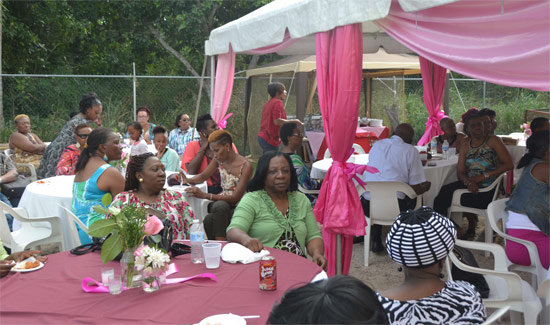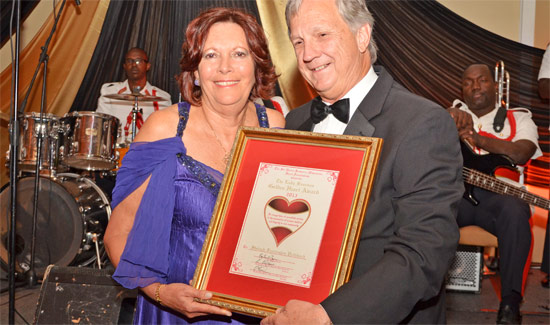
Nassau, The Bahamas, November 18, 2011—The 2011 Caribbean HIV Conference: Strengthening Evidence To Achieve Sustainable Action will commence this evening with more than 2,000 individuals from across the region in attendance. These individuals represent a wide range of interests, perspectives, and backgrounds, but they all share a common goal—to take part in forming a collaborative and sustainable response to the HIV epidemic in the Caribbean region.
The 2011 Caribbean HIV Conference will take place November 18–21, 2011, at the Atlantis Conference Center in Nassau, The Bahamas.
Tonight’s opening ceremony will feature a keynote address from The Right Honorable Hubert Alexander Ingraham, Prime Minister of The Commonwealth of The Bahamas, as well as a performance by acclaimed actress, singer, and activist Sheryl Lee Ralph of the United States. Best known for creating the role of Deena Jones in the Broadway musical Dreamgirls, Ms. Ralph will perform Sometimes I Cry, her one-woman play about women infected with and affected by HIV.
The opening ceremony also will include:
Remarks from the three Conference Co-Chairs about the unique opportunity this conference provides; how the conference was developed; and its history, goals, and expected outcomes
An invocation from The Most Reverend Patrick Christopher Pinder, Archbishop of Nassau
A performance by the Bahamas National Youth Choir
Video messages from individuals across the Caribbean speaking about why the conference is needed and why they are taking part
Achievement awards presented by the Pan Caribbean Partnership Against HIV and AIDS and the International Treatment Preparedness Coalition
An award presentation to The Honorable Donna M. Christensen, U.S. Virgin Islands Delegate to Congress, for her years of service in the fight against HIV
“This evening’s opening ceremony is designed to provide attendees with an informative, dynamic, and culturally meaningful introduction to the conference,” said Conference Co-Chair Prof. Daisy M. Gely of the Medical Sciences Campus, University of Puerto Rico. “We are all looking forward to marking the beginning of a collaborative and productive 4 days.”
Focused on Sustainability
The theme for this year’s conference, Strengthening Evidence To Achieve Sustainable Action, focuses on identifying a viable path that can be maintained in the future regional response to HIV.
“In the process of identifying the theme for this Conference, we reviewed the Caribbean’s HIV experience over the last three decades or so, and identified two critical and related concepts that we felt should be central to the Conference program—sustainability and the importance of evidence in guiding the strategies that will attain this goal,” said Conference Planning Committee member Roger McLean of the University of the West Indies at St. Augustine, Trinidad and Tobago.
“Sustainability is a key challenge facing the regional HIV response, and, to confront it effectively, we need to carefully evaluate what has and hasn’t worked well previously, share good practices and lessons learned, and work together in their application through more integrated approaches.”
The theme is woven throughout the conference agenda. It is incorporated into each of five program tracks, and it is the focus of the following sessions:
Sustainability Issues. Sunday, November 20, 9:00 a.m.–10:30 a.m.
Sustainability–Sustainable Caribbean HIV Conferences. Sunday, November 20, 11:00 a.m.–12:30 p.m.
Ensuring Sustainability: Increasing Funding for Community-Based Organizations To Fight HIV in the Caribbean. Sunday, November 20, 5:00 p.m.–6:30 p.m.
Small Island States–Issues, Challenges, and Opportunities. Monday, November 21, 9:00 a.m.–10:30 a.m.
Winning the Fight on HIV/AIDS in the Caribbean: How Partnering With Business Can Yield Significant Impact. Monday, November 21, 9:00 a.m.–10:30 a.m.
A major objective is that the conference will establish a special committee that will present preliminary recommendations to form the basis for a sustainability action plan. “We see the conference itself as a key component in the future,” said Conference Planning Committee member Osborne Nurse, who will lead the Caribbean HIV Conference’s special session on sustainability. “We see it as an activity that can dovetail into a regional strategic framework and be aligned with one or more of the key strategic objectives of such a plan.”
More About the 2011 Caribbean HIV Conference
This event is the third Caribbean HIV conference in the past decade, and it is designed to build on successes of the previous events, which demonstrated that regional cooperation and collaboration are key to confronting HIV in the Caribbean. Leading political, scientific, and public health leaders are included in the impressive roster of speakers contributing to the agenda.
Visit https://www.2011caribbeanhivconference.org/2011-caribbean-hiv-conference-speakers-announced to view a list of some of the featured speakers and session moderators.
The conference will be conducted in English and Spanish. To view the full conference program, visit http://www.2011CaribbeanHIVConference.org/agenda.
The 2011 Caribbean HIV Conference is sponsored by the Government of The Commonwealth of The Bahamas; Medical Sciences Campus, University of Puerto Rico; and the Office of AIDS Research, National Institutes of Health (NIH), U.S. Department of Health and Human Services. Prof. Gely’s Conference Co-Chairs are Dr. Perry Gomez, Director, National AIDS Programme, Princess Margaret Hospital, Ministry of Health, The Commonwealth of The Bahamas; and Dr. Jack Whitescarver, NIH Associate Director for AIDS Research and Director, Office of AIDS Research, NIH, U.S. Department of Health and Human Services, United States.
Partners for the conference include: Caribbean Community (CARICOM); Caribbean Health Research Council (CHRC); Caribbean Regional Network of People Living With HIV/AIDS (CRN+); Caribbean Treatment Action Group (CTAG); Caribbean Vulnerable Communities (CVC) Coalition; Joint United Nations Programme on HIV/AIDS (UNAIDS); Kerzner International; National Minority AIDS Council (NMAC); Pan American Health Organization/World Health Organization (PAHO/WHO); Pan Caribbean Partnership Against HIV and AIDS (PANCAP); U.S. President’s Emergency Plan for AIDS Relief (PEPFAR); Trans-Caribbean HIV/AIDS Research Initiative (TCHARI); and The University of the West Indies (UWI).
About HIV in the Caribbean
Although it varies from country to country, adult HIV prevalence in the Caribbean is approximately 1 percent, which is higher than that of any region of the world outside of Sub-Saharan Africa (UNAIDS 2010 Global Report). While the overall response to HIV in the Caribbean has improved, other health challenges and the impact of natural disasters affect the available resources for people living with the disease. Unprotected sex between men and women—especially paid sex—is thought to be the main mode of HIV transmission in this region (UNAIDS 2010 Global Report).



